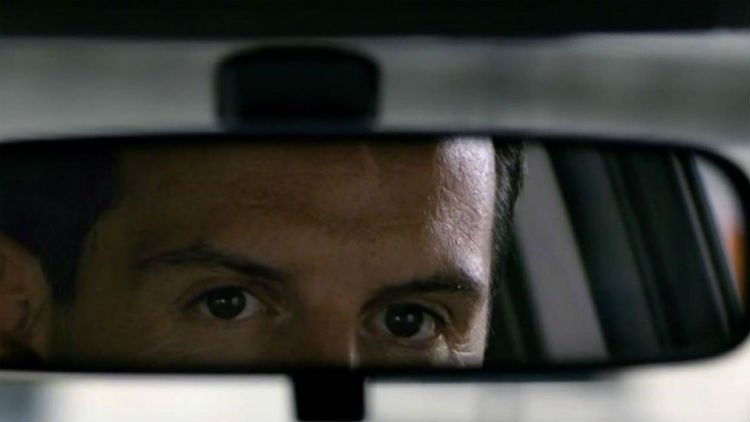
Throughout most of its history, Black Mirror has tackled issues of future/near-future technologies and their potential misuse/abuse by society. “Smithereens” changes up this formula, addressing an issue relevant in our current world and raising the question of just how addicted are we to those dopamine bursts delivered by the myriad of social media platforms surrounding us?
It begins innocently enough with Christopher Gillhaney (Andrew Scott, Sherlock, Fleabag), going about his day as a driver for an Uber/Lyft style company. But something deeper is going on with Chris, highlighted by his shifty glances, attempts to self-medicate, and visits to a grief support group. It’s not until he kidnaps Jaden (Damson Idris, Snowfall, The Commuter), an intern from Smithereen, the social media company he’s been staking out for the past few weeks that Chris’s motives are revealed. He demands to speak to Billy Bauer (Topher Grace, That 70s Show, Spider-Man 3), Smithereen’s founder. Chris is spectacular in how he bungles things, with mistakes that find him and his captive in a field surrounded by police as he tries holding them off by threatening Jaden’s life. There’s such ineptitude in Chris execution of this plan that, for a fair portion of the episode, “Smithereens” takes on a dark comedy type feel. Despite his bumbling, Chris is able to keep the authorities at bay, eventually getting his wish to speak to Bauer. What follows is a very personal confession by both men that casts a very relevant net across the growth and distractions of social media.

The bulk of Chris’s pain lies with the death of his fiancée Tamsin. Three years ago, the couple was hit by a drunk driver, one that killed both Tasmin and the driver; with the driver’s intoxication levels, he was assigned blame for the entire incident. Only, that was not the truth.
Chris admits that he was at fault, taking a second to peek down at his phone on a long, dark road, and that peek was all it took to irrevocably alter three lives (more when including Tasmin and the driver’s family a friends). While Chris shoulders responsibility for what happened, unloading some of the guilt he’s carried for the past three years, he also points to the Smithereen social media app as sharing a small portion of the blame.
As heartfelt as it is, it’s not Chris’s declaration that fosters the greater surprise; that lives with Billy unleashing his own confession on just how much of an out-of-control monster his creation has become. What was initially created as a tool to connect people had morphed into an electronic drug, continually being optimized to ensure user dependency, addiction.
It’s an idea that so encapsulates our own life with the FaceBook, Twitter, and YouTube’s of our current world that everything that follows—Chris’s one good deed for a fellow grief participant he slept with gain access to her dead daughter’s social media account, Jaden’s attempts to talk Chris out of killing himself (even trying to wrestle the gun away from him), and Chris’s apparent death at the hands of a police sniper—are incidental. It’s Chris and Billy’s exchange in “Smithereens” that is the episode’s greatest achievement, one emphasized as the credits roll to the extremely popular “Can’t Take My Eyes Off You”.
There’s no mistaking the fact that “Smithereens” will be a disappointment to some viewers. There’s no high-tech gear or crazy technological applications that have been the bread-and-butter of the series in previous seasons. Instead, we get a story that plays out in the news nearly every day where distracted drivers cause accidents because they selfishly pay more attention to their phones than the road. The immediacy of that truth, though, is what makes “Smithereens” such a sobering tale. We aren’t able to theorize about the horrible ‘what-ifs’ of near future technology. Instead, we’re relegated to examining our social media-inundated culture and ask the more relevant question of “why?”. The decision to place the lens of Black Mirror squarely on the more current climate may cause some to tune out but there are those who the message of “Smithereens” will hit all too close to home.
![]()
